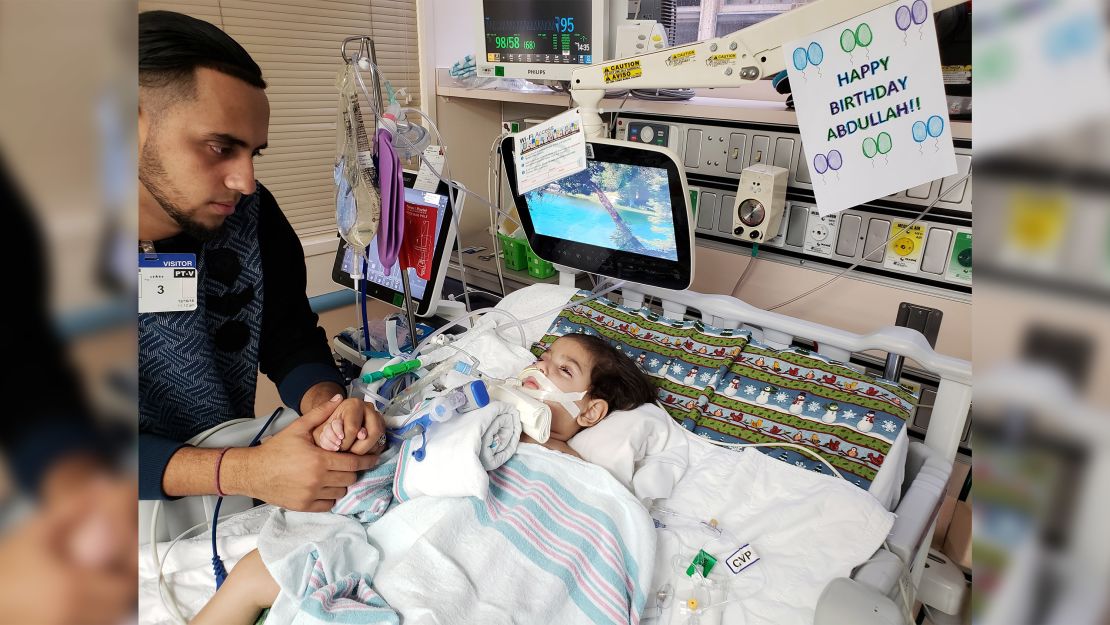The US State Department granted a Yemeni mother, whose 2-year-old son is on life support in an Oakland hospital, a waiver Tuesday to travel to the United States, according to officials with the Council on American-Islamic Relations.
Shaima Swileh will catch the earliest available flight out of Egypt and is scheduled to arrive in San Francisco on Wednesday evening, said Basim Elkarra, the executive director of the council’s Sacramento Valley chapter.
Money secured through a fundraising effort will pay for her flight and the boy’s funeral, he said.
The news came shortly after the boy’s father, Ali Hassan, appeared on CNN pleading with consular officials to expedite his wife’s visa application so that she’d be able to see her son one last time.
Hassan, 22, and his son, Abdullah, are American citizens, but Swileh lives in Egypt. Because she is Yemeni, she’s restricted from traveling to the United States under the White House travel ban.
After receiving a waiver to the ban, Swileh will travel to the United States on an I-130 visa, which permits entry to close relatives of American citizens, Elkarra said. Hassan spoke to her via video chat as she left the American Embassy in Cairo to prepare for her trip, he said.
“Unfortunately, even in this win, it’s still a loss, but at least she’ll come and be able to mourn with dignity and see her son get buried and bring some closure to all the pain,” Elkarra said.
“We just hope that she can make it in time and see her son in his last hours.”
Hours before news of the visa came, Hassan told CNN, “Time is running out for my son, to be honest. … All she wishes is to see her son, and that’s it. We want to be together.”
He issued a plea to President Donald Trump: “All families, they’re supposed to be together. Right now, with my son’s situation, he’s facing death. I’m going through losing my son. It’s really hard for me and for my mother and for my family and my wife, too. It’s just really hard.”
Abdullah, whose birthday was Saturday, is suffering from a genetic brain condition, and his father flew him to the States for treatment on October 1. It was the last time his mother saw him.
Doctors have told Hassan that patients such as his son are usually on life support for two or three weeks, or at maximum, a month. Abdullah has been on a ventilator at University of California San Francisco’s Benioff Children’s Hospital Oakland for more than a month, his father said.
“It’s really bad,” he said.

Swileh has been crying every day, and she calls Hassan saying she just wants to see her son and “give him a kiss before he goes,” the father told CNN.
“She’s going crazy,” he said.
Though Trump’s travel ban – billed as a means of thwarting terrorists’ entry into the United States – has drawn legal challenges, the executive order still restricts nationals of Yemen and six other countries from entering the country.
According to the State Department, consular officers can make exceptions to the travel restriction when a visa’s “issuance is in the national interest, the applicant poses no national security or public safety threat to the United States, and denial of the visa would cause undue hardship.”
State Department officials were not immediately available for comment Tuesday. On Monday, the department said it makes “every effort to facilitate legitimate travel by international visitors,” but an official said the department would not comment on individual visa cases.
CNN’s Keith Allen, Chris Boyette, Emanuella Grinberg and Dan Simon contributed to this report.





















